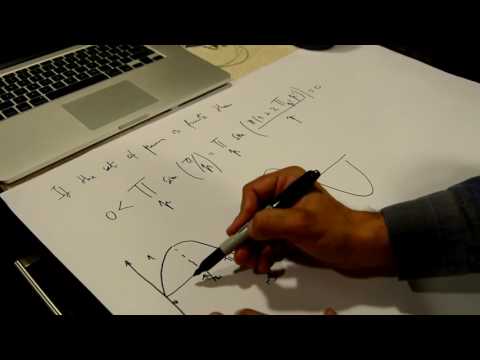The fact that there are infinitely many primes is one of the most f...
Let's first focus on the inequality
$$
0<\prod_{p} \sin \left( ...
A One-Line Proof of the Infinitude of Primes
Sam Northshield
May 2015
Proof. If the set of primes is finite, then
0 <
Y
p
sin
π
p
=
Y
p
sin
π · (1 + 2
Q
p
0
p
0
)
p
= 0
2
1
Let's first focus on the inequality
$$
0<\prod_{p} \sin \left( \frac{\pi}{p}\right)
$$
The sine function as we can see below is always positive for values of $0<x<\pi$, which means that every term $\sin \left( \frac{\pi}{p}\right)$, $p=2,3,5,7... $ is always going to be positive.

Since a finite product of positive terms is always going to be positive we conclude that $
\prod_{p} \sin \left( \frac{\pi}{p}\right)>0
$. It's very important that the product is finite and not infinite, since infinite products can converge to 0 even if all the terms are positive.
Now we need to prove the equality
$$
\prod_{p} \sin \left( \frac{\pi}{p}\right) = \prod_{p} \sin \left( \frac{\pi(1+2 \prod_{p'}p')}{p}\right)
$$
One property of the sine function is that it's a periodic function with period $2 \pi$
$$
\sin (x) = \sin (x + 2\pi)
$$
more generally we can write the same expression with multiples of $2\pi$
$$
\sin (x) = \sin (x + 2k\pi) , k =1,2,3,...
$$
If we look at the expression on the right we can write it as
$$
\prod_{p} \sin \left( \frac{\pi(1+2 \prod_{p'}p')}{p}\right)=\prod_{p} \sin \left( \frac{\pi}{p}+2 \pi \frac{\prod_{p'}p'}{p}\right)
$$
The product $\prod_{p'}p'$ of all the primes includes $p$ of course, which means that $\frac{\prod_{p'}p'}{p}$ is just the product of all the primes except $p$. In particular since $\frac{\prod_{p'}p'}{p}$ is a product of primes the result will be an integer (let's call it $k$ for simplicity).
Using the periodicity of the sine function we conclude that
$$
\prod_{p} \sin \left( \frac{\pi}{p}+2 \pi \underbrace{\frac{\prod_{p'}p'}{p}}_{k}\right) = \prod_{p} \sin \left( \frac{\pi}{p}\right)
$$
The last thing we have to prove is that
$$
\prod_{p} \sin \left( \frac{\pi(1+2 \prod_{p'}p')}{p}\right)=0
$$
If we observe the sine function we notice that the zeros are all located in the points of the form $x=m\pi$, $m=0,1,2,3,...$. This means that the only thing we need to do is to show that one of these terms $\frac{(1+2 \prod_{p'}p')}{p}$ is an integer. Since $1+2 \prod_{p'}p'$ is an integer there must be a prime $p$ that divides it and so $\frac{(1+2 \prod_{p'}p')}{p}$ is also an integer!
We have reached a contradiction since
$$
0<\prod_{p} \sin \left( \frac{\pi}{p}\right)=0
$$
and so there must be an infinite number of primes.
The fact that there are infinitely many primes is one of the most fundamental results in number theory.
This result has been proven by several famous mathematicians including Euclid, Euler and Paul Erdös (one of the most recent proofs by Filip Saidak has even been previously featured on [Fermat's Library](http://fermatslibrary.com/s/a-new-proof-of-euclids-theorem)). This one is definitely one of the shortest and explores the properties of the sine function to achieve the final result.
We also made a video explaining this paper
[](https://www.youtube.com/watch?v=-v6yPtM4VLA&feature=youtu.be "A One-Line Proof of the Infinitude of Primes")
IMHO there is a tautological flaw in this proof :
there are 2 cases in the expression $\prod_{p} \sin \left( \frac{\pi(1+2 \prod_{p'}p')}{p}\right)=0 $ where $p'$ contains $p$ :
1. $p'=p$ but the equality to $0$ can't hold
2. $p'>p$ the equality to $0$ can hold whatever is $p$ but this **prerequire** that each element in the set of primes got a successor thus this set is *recursively* infinite